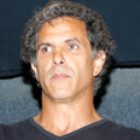 Juliano Mer-Khamis used theatre to bring change to Jenin’s refugee camp. But he faced constant intimidation and threats. Daniella Peled reports
Juliano Mer-Khamis used theatre to bring change to Jenin’s refugee camp. But he faced constant intimidation and threats. Daniella Peled reports
Israel and Palestine have reacted with shock to the murder of a well-known actor and campaigner of mixed Jewish-Palestinian heritage who was gunned down by masked assailants yesterday.
Juliano Mer-Khamis, the 52-year-old son of an Arab Christian father and an Israeli Jewish mother, was shot at least five times by unknown gunmen in the Jenin refugee camp where he ran a children’s theatre.
Conservative elements in the West Bank town disapproved of Mer-Khamis’s Freedom Theatre’s co-educational activities, and the content of some of its plays.
Two years ago Mer-Khamis himself said of his critics, “It makes them crazy that a man who is half-Jewish is at the head of one of the most important projects in the Palestinian West Bank, and it is just hypocritical racism.”
With eerie prescience, in 2009 he told the Israeli news site Ynet, “I have never been as Jewish as I am right now in Jenin. After all this work at the camp it would be extremely unfortunate to die of a Palestinian bullet.”
Those who knew Mer-Khamis describe him as a complicated character, a man who identified with both his Jewish and Arab heritage. Living between Jenin and the northern Israel city of Haifa, he served in the Israeli army as a paratrooper but remained a passionate advocate of Palestinian rights.
Mer Khamis’ mother Arna established a youth theatre in Jenin in the 1980s, the subject of an award-winning film by her son “Arna’s Children” in which he returned to the refugee camp five years after her death in 1995 to see what had become of the former participants.
In 2006 Mer-Khamis re-established it as the Freedom Theatre, but it was always a controversial project.
Its output included a production of Animal Farm which saw some children playing the parts of pigs, considered unclean animals in Islam. Former militant Zacharia Zubeidi — himself a graduate of the original children’s theatre — was brought in as co-director in an attempt to quell the criticism.
But the theatre was twice firebombed and in 2009 fliers were distributed in the refugee camp calling for the theatre’s closure and describing Mer-Khamis a traitor.
At the time, the actor told the Israeli news site Ynet that he had faced death threats.
“But what choice do I have? To run? I am not a fleeing man.”
The theatre’s programme director, Samia Staiti, who witnessed the killing, said this week that those who has opposed him were “trying to kill what Juliano tried to spread — peace and freedom. We will keep on going on.”
His death led Israeli news bulletins, with clips of him working with Palestinian children and interviewees describing him as a voice for peace.
Many of Israel’s leading cinema and theatre personalities praised his abilities an actor and activist, attributing his murder to his attempts to build bridges between the two sides.
Filmmaker Amos Gitai paid tribute to his dedication to both his art and his politics, adding, “I guess our region can’t suffer to have figures like that.”
There was no immediate claim of responsibility for the killing.
Daniella Peled is an editor at the Institute for War and Peace Reporting. A former foreign editor of the Jewish Chronicle, she writes widely on Israel and Palestine and is a regular contributor to Ha’aretz





